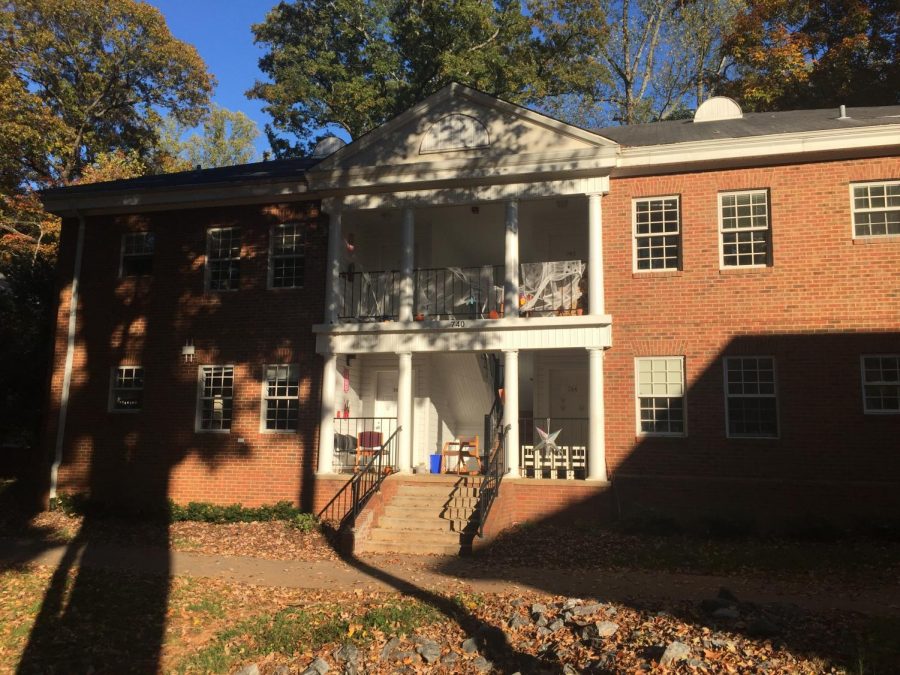Guilford’s party culture continues to struggle
The co-op in the North Apartments were going to hold a Halloween party before being issued a Cease and Desist notice.
In the collegiate world, the weekend of Halloween— or Halloweekend, as it is affectionately known— is understood to be something resembling two days of all-out partying. Traditionally, Guilford has been no exception to this rule; the ability to masquerade as a phantom or sexy nurse for a night seems to have a liberating effect that inspires college students to go wild. But this Halloweekend seemed to serve as a message that Guilford students cannot be as brazen about their partying as was once the case.
On Nov. 1, an email titled “IMPORTANT// CEASE AND DESIST – LIQ OR TREAT 2019” was sent to the student body by Michelle Ward, community director of the North, South and East Apartments. The email was a response to “Liq or Treat,” a Halloween party being planned by the Pines co-op in the North Apartments.
The co-op is the last vestige of the former theme houses, a set of three student houses revolving around themes such as sustainability, or specifically housing international or non-binary and women students of color. The theme houses, which were once hot spots for student parties and gatherings, closed down after the spring 2019 semester. Some students believe this to be a critical blow against student organization.
One prevailing theory among students is that there has been a crackdown on an old Guilford culture of community organization following protests led by the student body in the spring of 2017.
“After the protests (in spring 2017), there was this reaction from the administration of, ‘We can’t be having this sort of student energy and collaboration,’” said senior and co-op resident Madison Shankin.
“So they got rid of the places where that organization could be happening and consolidated us into places where we could be policed easier.”
“Liq or Treat” was issued a Cease and Desist notice due to its violation of Guilford’s Posting/Soliciting policy when students posted flyers advertising the event on doors in the North and South Apartments. Additionally, Ward warned that students found participating could accrue violation points that could lead to their suspension from Guilford.
“ I think the mistake with Liq or Treat may have been the flyering instead of just making a Facebook event. And calling it Liq or Treat may have been an oversight,” said senior and co-op resident Clare Chalkley.
“But I would want us to be able to be a little more free than we are currently. I think there has been a crackdown, or a tightening of restrictions. There has been a more watchful eye on this campus and a lot of our freedoms are quieted or silenced.”
Senior and co-op resident Annika Norris believes the scrutiny being placed on students living on campus is overbearing, as they have little choice about where they can live.
“ All these rules are being applied to this forced community. We can’t live off campus, and we can’t have theme houses. It’s like we’re being quarantined,” Norris said.
“This is the treatment I would expect as a freshman, from my freshman RA. Most of the residents in the co-op are 21.”
The removal of theme houses severely limits where students can gather for parties. For Shankin, parties are a vital way to raise campus spirit.
“When our culture is lacking like it is now, parties are a way to rebuild it,” Shankin said. “They build your passion for the school and excitement for the weekend. It’s a way to hang out with your friends and get dressed up and have fun and dance. When people say ‘the college experience,’ what they mean is going to parties. We can’t ignore that.”
Chalkley also emphasized the importance of parties to a college community.
“I think everyone needs a place to unwind and dance,” Chalkley said. “We’re not the tiny town from ‘Footloose,’ are we?
“Everyone needs a chance to unwind at the end of the week. The purpose of a party isn’t necessarily to drink, and a lot of people who come to parties don’t drink at all. They just want to have fun and be in community,”she said.
Although complaining about the difficulty of hosting parties may seem trite to some, it can also be viewed as a limiting of student autonomy and emblematic of a culture shift at Guilford— a farewell to the theme houses, Greenleaf and Bonner House that previously served as the campus’s student gathering spots.
“This is a case of there used to be no rules, and now all of a sudden, all the rules are being applied,” Shankin said. “We need a community space to just hang out, and they took those from us.”
To Chalkley, these changes and replacements of long-beloved student spaces is potentially troubling.
“There is absolutely a culture shift at Guilford,” Chalkley said. “I saw an article about this school in Ohio that made changes very similar to the ones that Guilford is making, but they made those changes four years ago and are now floundering. They’re in financial distress and are about to lose their accreditation. I think Guilford is making a gamble to make more money and more students. I don’t know if that gamble is going to pay off.”
Editor’s note: This story originally was published in Volume 106, Issue 5 of The Guilfordian on Nov. 8 2019.










